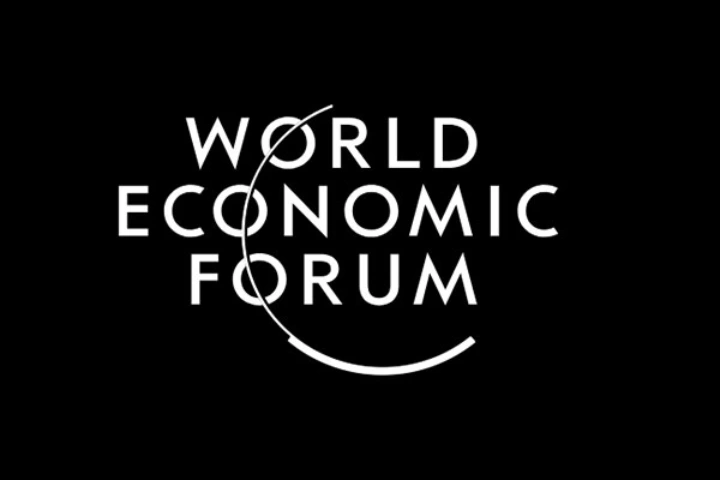

World Economic Forum logo
The latest Chief Economists Outlook released by the World Economic Forum on Wednesday presents a cautiously optimistic view of the global economy in 2024, tempered by significant political risks.
According to the report, 82 per cent of chief economists expect the global economy to either strengthen or remain stable this year, nearly double the proportion from late 2023.
The share of those predicting a downturn in global conditions has dramatically decreased from 56 per cent in January to just 17 per cent.
However, geopolitical and domestic political tensions loom large. About 97 per cent of respondents anticipate that geopolitical factors will contribute to global economic volatility in 2024.
Additionally, 83 per cent believe domestic politics will also be a significant source of volatility, particularly as nearly half the world’s population heads to the polls this year.
Saadia Zahidi, Managing Director, World Economic Forum, said, “The latest Chief Economists Outlook points to welcome but tentative signs of improvement in the global economic climate. This underscores the increasingly complex landscape that leaders are navigating. There is an urgent need for policy-making that not only looks to revive the engines of the global economy but also seeks to put in place the foundations of more inclusive, sustainable and resilient growth.”
The outlook for economic growth varies significantly by region. The survey indicates a substantial improvement in the United States, where nearly all chief economists (97 per cent) now foresee moderate to strong growth this year, up from 59 per cent in January.
Asian economies also show robust prospects, with all respondents projecting at least moderate growth in the South Asia and East Asia and Pacific regions.
Expectations for China are slightly less optimistic, with three-quarters expecting moderate growth and only 4 per cent predicting strong growth.
In contrast, Europe’s outlook remains bleak, with nearly 70 per cent of economists predicting weak growth for the remainder of 2024.
Other regions are expected to experience broadly moderate growth, showing a slight improvement since the previous survey.
The survey highlights the escalating challenges faced by businesses and policy-makers. Tensions between political and economic dynamics are expected to increase, posing a significant challenge for decision-makers this year, according to 86 per cent of respondents. Moreover, 79 per cent anticipate that heightened complexity will impact decision-making processes.
Key factors expected to influence corporate decision-making include the overall health of the global economy (cited by 100 per cent), monetary policy (86 per cent), financial markets (86 per cent), labor market conditions (79 per cent), geopolitics (86 per cent), and domestic politics (71 per cent). Interestingly, 73 per cent of economists believe that companies’ growth objectives will drive decision-making, almost double the proportion that cited the role of companies’ environmental and social goals (37 per cent).
Looking ahead, most chief economists are optimistic about the prospects for sustained global growth, with nearly 70 per cent expecting a return to 4 per cent growth within the next five years (42 per cent within three years).
In high-income countries, growth is anticipated to be driven by technological transformation, artificial intelligence, and the green and energy transition.
However, there is less consensus on the impact of these factors in low-income economies. Geopolitics, domestic politics, debt levels, climate change, and social polarization are widely expected to be drags on growth across both high- and low-income economies.
Policy levers deemed most likely to foster growth over the next five years include innovation, infrastructure development, monetary policy, and education and skills.
Low-income economies are seen as having more to gain from interventions in institutions, social services, and access to finance compared to high-income economies.
There is notable disagreement on the impact of environmental and industrial policies on growth.
Israel Defence Forces Spokesperson Brigadier General Effie Defrin on Thursday said that Iran has expressed…
India's Hindustan Aeronautics Limited (HAL) and French engine manufacturer, Safran Aircraft Engines, signed an agreement…
India has emerged as a country with the third-largest growth in power generation capacity globally…
Prime Minister Narendra Modi hailed Indian chess grandmaster Divya Deshmukh for defeating world number one…
The family of detained Baloch leader Mahrang Baloch has accused prison authorities at Quetta's Hudda…
The QS World University 2026 Rankings bring great news for our education sector, as the…